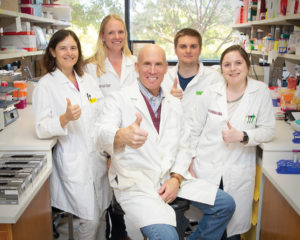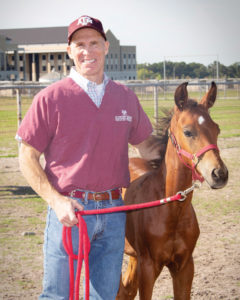Out With Antibiotics, In With Vaccines
Dr. Noah Cohen and his fellow CVM researchers help discover new strategy to protect foals from deadly infection.
Story by Callie Rainosek
Researchers at the Texas A&M College of Veterinary Medicine & Biomedical Sciences (CVM) have helped successfully develop a strategy to protect foals from developing a common and severe form of pneumonia by vaccinating pregnant mares weeks before giving birth.
Pneumonia, which is potentially deadly in foals between 3 and 6 months of age, is commonly caused by the bacterium Rhodococcus equi.

R. equi frequently infects the lungs of foals, causing symptoms such as fever and coughing. However, by the time symptoms are present, the infection is well-progressed and more difficult to treat with antibiotics.
Because of this, some veterinarians choose to treat foals without symptoms with antibiotics to reduce the risk of severe disease or even death. This practice, however, raises the risk of R. equi becoming antibiotic resistant.
That’s why clinician-scientists such as Dr. Noah Cohen are developing strategies that include vaccines, immune system stimulants, and new types of antibacterial drugs to protect foals against R. equi and other bacterial infections without the use of antibiotics.
ADVANTAGEOUS ANTIBODIES
Within the CVM’s Department of Large Animal Clinical Sciences, Cohen is a professor in large animal internal medicine and the associate department head for research and graduate studies. In collaboration with researchers at Harvard Medical School, Cohen was recently co-senior author on a study published in the scientific journal PLOS Pathogens. The study described the first vaccine effective against R. equi in foals.
The study, led by CVM graduate assistant Joana Rocha and Dr. Colette Cywes-Bentley, assistant professor at the Harvard Medical School, compared the susceptibility to pneumonia caused by R. equi between foals born to vaccinated mares and foals born to unvaccinated mares.
Study results indicated that the vaccine protected foals from R. equi pneumonia and that this protection was mediated by antibodies transferred from mares to their foals via colostrum (the first form of milk produced by the mammary glands).

“Vaccination of mares during late pregnancy is routinely practiced to protect foals,” Cohen explained. “Vaccination during pregnancy is necessary because unlike humans, horses lack the ability to transfer antibodies to their fetuses via the placenta. Consequently, foals rely on receiving antibodies through their mare’s colostrum during the first few days of life to provide them with immune protection.”
At 4 weeks of age, researchers tested the resistance to R. equi in foals that were born to mares that had been vaccinated.
Eleven of the 12 foals born to mares that had been vaccinated did not develop R. equi pneumonia. In a control group of seven mares that did not receive a vaccine against R. equi, six of the seven foals born to these mares developed pneumonia after exposure to R. equi at 4 weeks of age. All foals infected with R. equi pneumonia in this study recovered.
These results indicate that the vaccine given to mares during pregnancy is an effective way to protect foals against R. equi pneumonia.
“Our study is the first vaccine to have demonstrated efficacy to protect foals against pneumonia caused by R. equi,” Cohen said. “After many years of trying, this appears to be a breakthrough.”
A strategy that emphasizes the prevention of R. equi pneumonia is especially significant considering that the bacterium is ubiquitous in the environment.
“We find R. equi in different aspects of the environment, including soil and horse feces, so foals are exposed to R. equi from the moment they are born,” said Angela Bordin, an assistant professor of immunology and infectious disease at the CVM.
Bordin, who also took part in the research study, added, “It is not known why some foals develop pneumonia from exposure to R. equi and some do not. Vaccinating the mares, however, seems to protect most of the foals.”
A GLOBAL HEALTH PROBLEM

Establishing a vaccine to protect foals against R. equi pneumonia would not only save foals’ lives, but also would help lower the risk of R. equi becoming antibiotic resistant.
Cohen and his colleagues have already documented the emergence of resistance to the class of antibiotics most effective and commonly used to treat R. equi pneumonia in foals. Therefore, it is of utmost importance to reduce the use of antibiotics used to treat this disease.
However, the threat of antibiotic-resistant R. equi is just one example of why it is important to reduce the general use of antimicrobials. Cohen said that “antimicrobial resistance is a global health problem in both human and veterinary medicine.”
Cohen hopes this study will help shift the emphasis of treating R. equi pneumonia with antibiotics to a method that will help the patient’s immune response protect them against infection. Creating a vaccine to prevent the development of R. equi pneumonia “is of global importance,” Cohen said.
One especially exciting aspect of the success of this vaccine is that it suggests the possibility of protecting foals against other bacterial infections. However, more research is needed to know for sure.
Cohen noted that any future research will continue to keep the health and safety of the mare and foal a top priority.
###
Note: This story originally appeared in the 2019 Spring edition of CVM Today.
For more information about the Texas A&M College of Veterinary Medicine & Biomedical Sciences, please visit our website at vetmed.tamu.edu or join us on Facebook, Instagram, and Twitter.
Contact Information: Jennifer Gauntt, Interim Director of Communications, Media & Public Relations, Texas A&M College of Veterinary Medicine & Biomedical Science; jgauntt@cvm.tamu.edu; 979-862-4216


